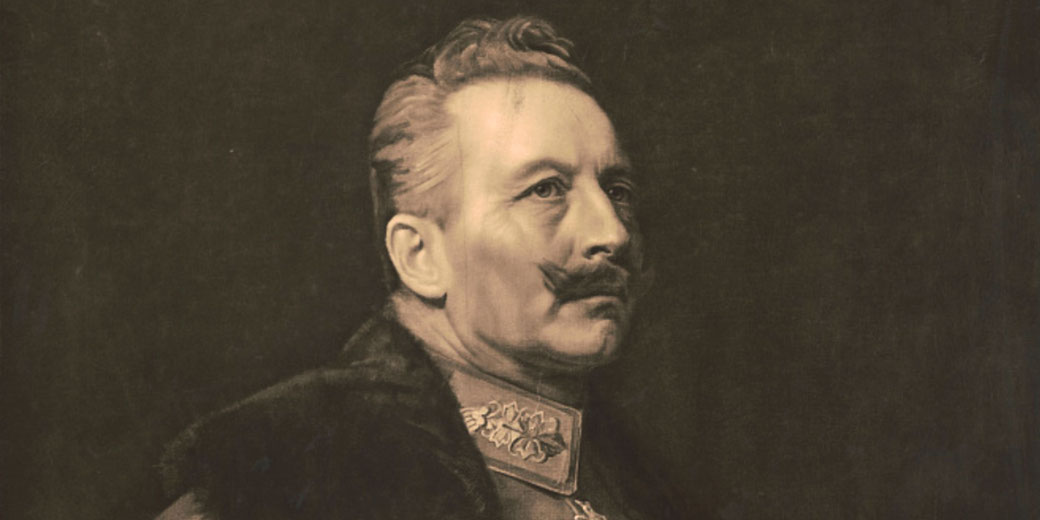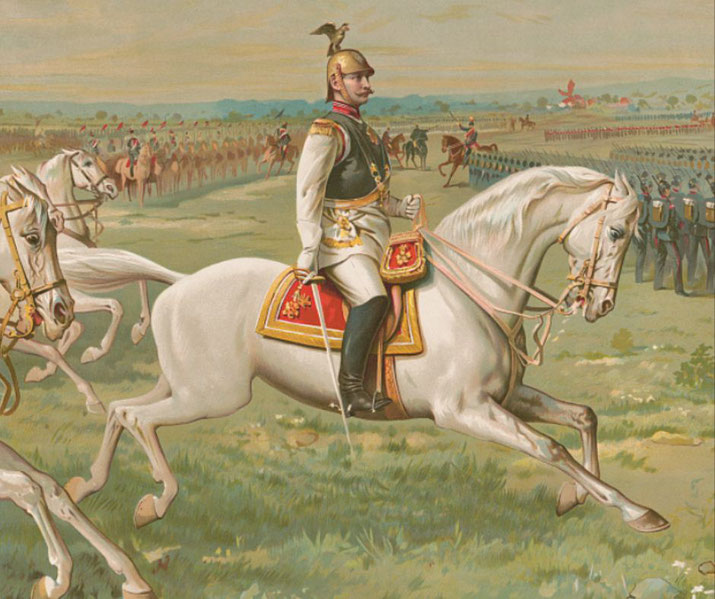The rise and fall of Kaiser Wilhelm II: Germany's last emperor's turbulent reign

Wilhelm II ruled Germany during one of the most violent and dramatic periods in modern European history. His reign began with great expectations in 1888, but ended in humiliation and exile in 1918.
He entered office with ambitions to elevate Germany’s global influence, yet his unpredictable behaviour and inconsistent diplomacy, combined with a refusal to share power, undermined the continent.
Over the course of three decades, he contributed to the breakdown of the international system, presided over a disastrous war, and witnessed the destruction of the monarchy he inherited.
Early Life and Ascension to the Throne
Wilhelm entered the world on 27 January 1859 as the first child of Prince Friedrich of Prussia and Princess Victoria, the eldest daughter of Queen Victoria.
He was born into two powerful dynasties which meant that he grew up surrounded by conflicting expectations.
His Prussian tutors emphasised obedience and nationalism, supported by a deep-rooted military tradition, while Wilhelm's mother attempted to shape him into a liberal constitutional monarch in the English mould.
Neither influence succeeded fully. He absorbed Prussian militarism and adopted authoritarian tendencies, but remained insecure and sensitive to criticism throughout his life.
Unforutnately, complications at his birth left his left arm permanently withered.
Though he underwent years of painful treatments and military training, the injury remained visible and his disability embarrassed him, especially during ceremonial occasions.
He compensated for this with displays of aggression and force. Teachers and relatives described him as intelligent, but erratic and emotionally unstable.
He often switched between grand statements and private self-doubt.
Following the death of his grandfather, Wilhelm I, in March 1888, and the brief reign of his cancer-stricken father Frederick III, Wilhelm became emperor at the age of twenty-nine.
The transition was a major change in German politics. Within two years, Wilhelm forced the resignation of Chancellor Otto von Bismarck, who had dominated German policy for nearly two decades.
Foreign Policy and Diplomacy
In the years following Bismarck’s dismissal, Wilhelm introduced an aggressive foreign policy known as Weltpolitik.
Under this approach, Germany pursued colonial expansion and naval development with growing intensity.
Laws passed in 1898 and 1900, introduced under Admiral Alfred von Tirpitz with Wilhelm's approval, authorised the construction of a powerful navy.
By openly challenging British naval supremacy, Wilhelm contributed to a bitter rivalry that damaged Anglo-German relations beyond repair.
However, a series of imperial conferences and public statements revealed Wilhelm’s lack of diplomatic skill.
His congratulatory telegram to Paul Kruger in 1896, following the Boer victory over the British in the Transvaal, angered officials in London.
Also, he continued to provoke tensions by interfering in North African affairs. His visits to Tangier in 1905 and Agadir in 1911 weakened French control in Morocco and nearly brought Europe to war.
The resulting crises pushed Britain and France into closer cooperation, further isolating Germany.
Relations with Russia deteriorated after Wilhelm allowed the lapse of the Reinsurance Treaty in 1890.
The failure to renew the agreement opened the way for a Franco-Russian alliance, which created a two-front threat to Germany.
Though Wilhelm shared personal correspondence with his cousin Nicholas II of Russia and maintained ties with the British royal family, his personal efforts failed to translate into lasting alliances.
Public statements and private interference confused Germany’s partners and enemies alike.
Rather than deterring war, his behaviour actually contributed to its certainty.

His role in the start of WWI
When the July Crisis unfolded in 1914, Wilhelm gave Austria-Hungary a sweeping guarantee of support against Serbia.
His promise, offered within days of Archduke Franz Ferdinand’s assassination, became known as the “blank cheque.”
Because Germany had offered its full support, Austrian leaders delivered a harsh ultimatum to Serbia.
When Serbia failed to meet all demands, Austria declared war. Russian mobilisation followed soon after, and Germany prepared for a general European conflict.
Although Wilhelm later claimed he had tried to prevent the war, his actions tell a different story.
The German invasion of Belgium followed the Schlieffen Plan, which violated neutrality agreements.
Wilhelm expressed surprise at the British response, though his advisers had previously warned him that violating Belgian neutrality would likely bring Britain into the war.
As events spiralled out of control, his authority diminished. In his place, military leaders, particularly Hindenburg and Ludendorff, took control of the war effort.
This meant that Wilhelm became increasingly symbolic, as he gave speeches and reviewed troops even though real decisions passed to others.
Over the next few years, Wilhelm remained trapped between public expectations and military reality.
Letters from the front and notes from advisers reveal his frustration and helplessness.
He blamed foreign powers and political opponents, as well as members of his own government, for the crisis.
As the war dragged on, his popularity declined sharply and the myth of the all-powerful Kaiser collapsed under the weight of military failure and political disunity.
Germany's failures in the war
From the beginning, Germany fought a two-front war against France and Russia.
The Schlieffen Plan had aimed to defeat France quickly before turning east, but failed during the First Battle of the Marne.
By late 1914, trenches stretched across Belgium and northern France. On the Eastern Front, Germany achieved several victories against Russian forces, but supply problems and shifting alliances prevented any lasting advantage.
The war placed enormous strain on the German economy and population as food shortages, caused by the British naval blockade and internal problems, led to growing unrest in German cities.
The winter of 1916 to 1917, known as the "Turnip Winter," saw severe hunger, and public support for the war declined.
Workers went on strike, while a wide spectrum of critics, including Socialist groups and Catholic centrists, along with disaffected military officers, condemned the imperial government.
Wilhelm was unable to unite these factions. As a result, he lost the confidence of both civilians and the generals.
Germany’s decision to resume unrestricted submarine warfare in 1917 triggered American entry into the war.
With the arrival of fresh American troops and supplies, the Allies gained a clear advantage.
The spring attacks of 1918, which were launched by Germany in a final attempt to win, failed to break the Allied lines.
In the following months, German forces retreated steadily and defeat became unavoidable.
The commanders no longer believed victory could be achieved. As a reult, government officials began searching for an exit strategy.
Abdication and Exile
By November 1918, rebellion spread across Germany. Naval mutinies in Kiel triggered revolts in major cities, while workers’ and soldiers’ councils took control in Berlin, Munich, and elsewhere.
In particular, the Social Democratic Party, under Friedrich Ebert, demanded political change.
General Wilhelm Groener informed the Kaiser that the army would no longer support him.
Finally, under mounting pressure, Wilhelm fled to Spa in Belgium and eventually crossed into the Netherlands.
On 9 November 1918, Prince Max of Baden, who was acting as Chancellor, announced Wilhelm’s abdication without his formal consent.
Two days later, Wilhelm signed official documents relinquishing his titles. The same day, the armistice ended the war.
The Dutch government allowed Wilhelm to settle in Doorn, where he bought a small estate.
He lived in exile for more than two decades and filled his days with memoirs, classical histories, and bitter tirades against the Weimar Republic and his political enemies.
While in exile, Wilhelm maintained hopes for restoration and he remained loyal to monarchical ideals and criticised the rise of republicanism.
He welcomed early signs of German revival under Adolf Hitler, but later turned against the Nazis after they failed to restore the monarchy.
In his private writings, he also criticised aspects of Nazi racial policy and viewed their regime as a betrayal of traditional values.
Though he issued occasional statements, few Germans paid attention. His influence had vanished, and his relevance faded with the passing years.
Death and Legacy
On 4 June 1941, Wilhelm died at the age of eighty-two. Hitler sent a wreath but denied his request to be buried in Germany.
The funeral took place quietly in Doorn, with a small number of loyalists in attendance, but no major political figure from Germany visited his grave.
The emperor who had once ruled over a powerful empire passed into history without ceremony.
Historians continue to assess Wilhelm’s legacy with caution. Some view him as a weak and impulsive monarch who lacked the skill to control his own government.
Others point to his erratic temperament and obsession with personal prestige as sources of Germany’s diplomatic failures.
His interference in foreign affairs, dismissal of Bismarck, and support for aggressive militarism contributed directly to the outbreak of war.
Wilhelm II came to power in a united, industrialised, and confident empire. By the time he abdicated, Germany lay in defeat, its monarchy abolished and its society fractured.
What do you need help with?
Download ready-to-use digital learning resources
Copyright © History Skills 2014-2025.
Contact via email
With the exception of links to external sites, some historical sources and extracts from specific publications, all content on this website is copyrighted by History Skills. This content may not be copied, republished or redistributed without written permission from the website creator. Please use the Contact page to obtain relevant permission.





